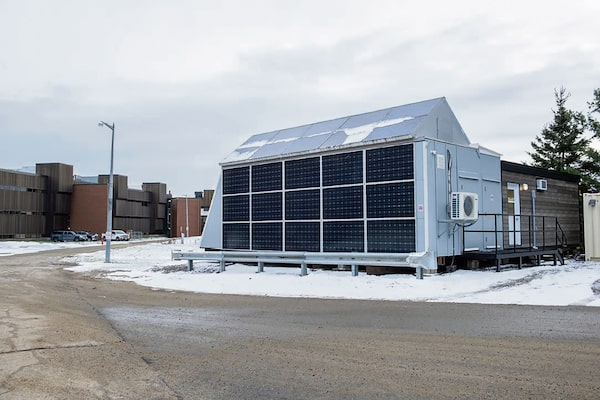
Canadore College is conducting research that aims to advance food security at its sustainable food development site, called the Controlled Environment Agriculture Centre of Excellence.SUPPLIED
As part of a national network of college and institute campuses showcasing ways to reduce greenhouse gas emissions, Canadore College is going one step further to advance a key goal for the region: food security for rural and Indigenous communities.
“As part of the ImpAct Climate project, Colleges and Institutes Canada [CICan] put a call out to develop living lab projects that demonstrate ways to implement greenhouse gas emission reductions in areas including food, green building and Indigenous practices,” says Jesse Russell, Sustainable Development project leader.
In response, Canadore has created a sustainable food development site called the Controlled Environment Agriculture Centre of Excellence, a grow pod located at the College Drive Campus in North Bay, Ontario.
“This grow pod is climate resistant and operates off grid, thereby displacing the use of fossil fuels,” says Mr. Russell. “It is currently supplying vegetables and herbs to Canadore’s on-campus restaurant 100 Elements.
This grow pod is climate resistant and operates off grid, thereby displacing the use of fossil fuels. It is currently supplying vegetables and herbs to Canadore’s on-campus restaurant 100 Elements.
— Jesse Russell, Sustainable Development Project Leader, Canadore College
“The grow pod reduces our carbon footprint and eliminates most of the embodied carbon that is associated with bringing fresh herbs and produce into the culinary area,” he explains. “Produce from the pod is delivered on foot rather than by a refrigerated truck.”
Shane Ralli, an Environmental Management program student working on the CICan project, says, “Using hydroponics, we can grow plants from around the world that are notably free from harmful chemicals in a self-sustainable environment.”
The importance of food security is gaining traction globally, says Angela Proudfoot, project administrator, Sustainable Food and Clean Water. “It’s a pressing issue that needs to be a high priority, given the state of food resources. The grow pod is a brilliant example of sustainability, using renewable resources and a small land footprint. It has the capacity to grow a vast array of food, medicine and more with the right ecosystem management.”

For northern communities, growing produce in greenhouses can help to reduce reliance on provisions having to be flown in.SUPPLIED
Canadore’s focus on food security through the CICan ImpAct Climate project is a response to pressing community needs. “We are working directly with northern Indigenous communities to identify needs and barriers to fresh, healthy food possibilities in the North,” said Carly Renaud, manager, Indigenous Research and Development in Canadore’s First Peoples’ Centre. “Historically, fresh produce has been cost-prohibitive and scarce in northern communities, especially those that have to rely on provisions being flown in. Often the fresh produce that does arrive is past its prime – and sometimes even deteriorated to such a degree that it is not consumable.”
The goal is to showcase the grow pod as a climate-resistant option that can help get produce to rural and Indigenous communities at a fraction of the cost and increase the ability to grow produce year-round, notes Ms. Renaud. “Climate change and other factors have impacted the ways that communities have traditionally harvested food, and we hope to provide sustainable ways to increase food security in the North.
“Access to healthy fresh produce has an impact on physical and mental health and overall well-being. The ability to increase food sovereignty in First Nation communities will have a huge effect on the quality of life for Indigenous peoples.”
Advertising feature produced by Randall Anthony Communications with Colleges and Institutes Canada. The Globe’s editorial department was not involved.